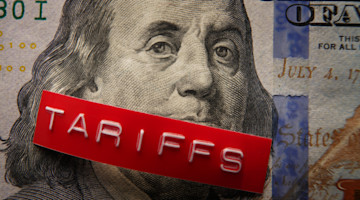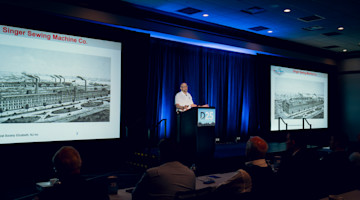In its July update, the IMF revised India's GDP growth projection for 2025 to 6.4%, up from the 6.2% it had forecast in April 2025. The outlook for 2026 remains robust, with growth expected to slightly rise to 6.4%, reflecting sustained momentum in economic activity. Meanwhile, India's manufacturing PMI rose to 59.1 in July from 58.4 in June, indicating a substantial expansion in manufacturing activity.
On the trade front, the United States has announced a 25% blanket tariff on all imports from India, effective Aug. 7, 2025. Key sectors likely impacted include gems and jewelry, pharmaceuticals, textiles, electronics, refineries, and auto components. However, the structure and modalities of the proposed U.S.-India trade deal are still undergoing negotiations, with several key U.S. representatives expected to visit India around mid-August to resolve the current stalemate.
India and the U.K. signed the Comprehensive Economic and Trade Agreement (CETA), a significant step toward deeper economic integration.
Key agreements in the deal include:
Increase in bilateral trade by $34 billion a year from 2040.
Double trade by 2030.
Duty-free access for 99% of Indian exports to the U.K., covering textiles, leather, toys, marine products, gems and jewelry, engineering goods, auto components, and organic chemicals.
U.K. exports to India – including liquors, aerospace parts, electrical and medical devices, cosmetics, chocolate, and luxury cars – will benefit from reduced duties, lowering their landed costs.
In the aerospace sector, India has chosen France's Safran over Rolls-Royce for a $7.5 billion joint venture to codevelop a 120-kilonewton thrust engine for its fifth-generation Advanced Multirole Combat Aircraft (AMCA), a significant boost to the country's defense indigenization and aerospace capabilities.
Key highlights of this partnership include:
Complete technology transfer to India.
Production of 250 Safran engines over the next decade.
AMCA prototype rollout scheduled for 2027.
First flight anticipated by 2028.
India’s automotive component industry reached $80.2 billion in fiscal year 2024-2025, marking a growth of 9.6% year over year and a five-year CAGR of 14%. Strong domestic demand, higher exports, and increased value addition support this growth. Sales to OEMs registered a 10% YOY growth in FY2025, driven by an 8% increase in overall vehicle production. Exports grew by 8% to $23 billion, while imports stood at $22.4 billion, rising by 7.3%. The aftermarket grew by 6% to $11.8 billion.
According to Gardner Media's World Machine Tool Survey Report for 2025, India's machine tool consumption ranked fourth, up from sixth in 2023. In terms of value, consumption grew by 15% to $3.62 billion in 2024 from $3.15 billion in 2023. India rose to fifth in machine tool imports, compared to seventh in 2023, with imports growing by 18% to $2.09 billion in 2024, up from $1.78 billion in 2023. India remains ninth in machine tool production for 2024, with a 9% increase in value, producing $1.69 billion of machine tools, compared to $1.56 billion in 2023.
A few recently announced projects and investment news items are listed below:
Godrej Aerospace has secured a contract from Pratt & Whitney to manufacture complex aerospace parts for aircraft engine applications. The company has a 375,000-square-foot aerospace facility, with an additional 530,000-square-foot facility currently under development.
Maini Precision Products Ltd. has also entered into a long-term agreement with Pratt & Whitney to supply precision, machined, and assembled aerospace components.
RRP Defense Ltd. and CTGR from France have partnered to establish a world-class drone manufacturing facility in Navi Mumbai. The facility will produce hand-launched, fixed-wing drones, nano drones for close-range and indoor surveillance, and ISR drones for intelligence, surveillance, and reconnaissance.
Japanese automotive component maker Denso Corp. is setting up a manufacturing plant in Gautam Budh Nagar, Uttar Pradesh, to produce motor generators for hybrid and electric vehicles.
Tata Motors is acquiring Italian commercial vehicle maker Iveco in a deal valued at around $4.4 billion. This acquisition seeks to boost Tata's commercial vehicle segment by giving it access to European, North American, and Latin American markets, which are crucial for sustainable success and long-term value creation.
Automaker Renault is investing around $600 million to launch compact and mid-sized SUVs in India. This will boost factory utilization levels and grow domestic sales and exports.
Bharat Earth and Movers Ltd. has acquired 148 acres of land in Madhya Pradesh to set up a state-of-the-art rail coach manufacturing plant.
Renk opened a manufacturing facility in Shoolagiri, India, to support defense and industrial products. The plant will produce gear units for cement mills, gearboxes for the power and energy sectors, and couplings for global deployment.
Jabil is investing over $250 million in a plant in Sanand, Gujarat, to manufacture silicon photonics and other electronics.
Dixon Technologies, a contract manufacturer of electronics, received government approval to proceed with its joint venture with Chinese original design manufacturer Longcheer Intelligence. Dixon will hold 74% of the JV, while Longcheer will have the remaining 26%. The proposed JV company, Dixtel Infocomm, will manufacture and supply smartphones, tablets, true wireless stereo devices, smartwatches, AI-enabled personal computers, automotive electronics, and health care devices.
For more information, please contact Arun Mahajan at AMahajan@AMTonline.org, and to learn how to take advantage of these opportunities, click here.






